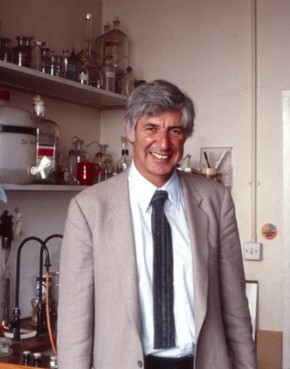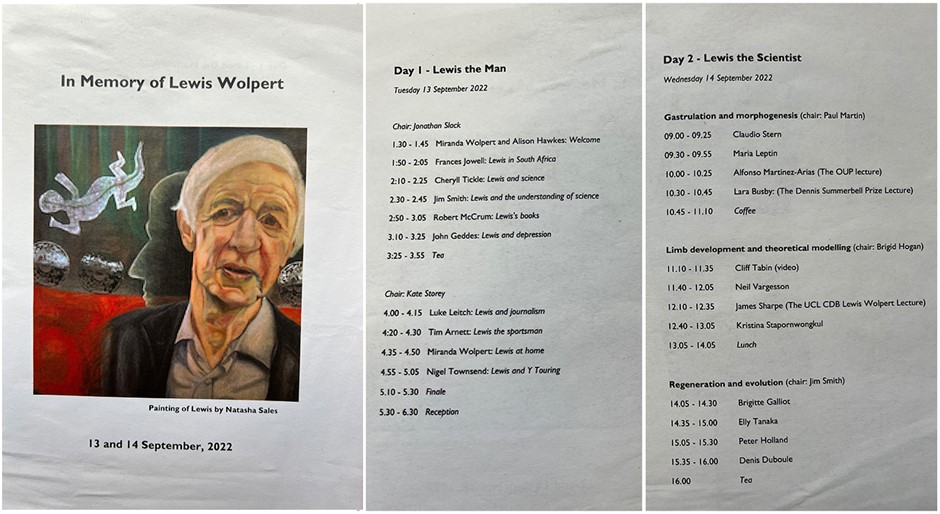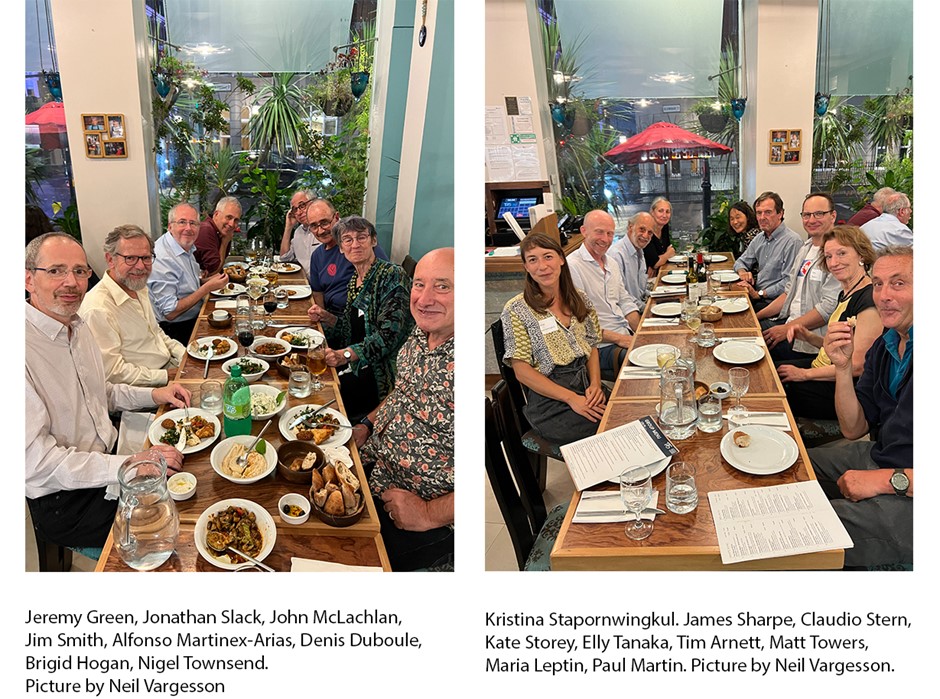Lewis Wolpert Memorial Symposium – Meeting Report
Posted by BSDB, on 1 November 2022
13–14 September 2022, University College London
The Symposium was organised by Alison Hawkes, Jonathan Slack, Jim Smith, Claudio Stern, Cheryll Tickle and Neil Vargesson. Kindly supported by the British Society for Developmental Biology, Oxford University Press and UCL.

To many readers of the Node, Lewis Wolpert, who died on 28th January 2021, was above all a developmental biologist—one of the most distinguished and influential of his generation (Figure 1). But of course he was much more than this, and the organisers of this meeting in his memory devoted the first day to Lewis the man (Figure 2). We heard from his cousin Frances Jowell about his early life in South Africa, about his aunt Helen Suzman (the politician and anti-apartheid activist), and about Lewis’s own hatred of apartheid. Frances also explained how Lewis arrived in London, having hitch-hiked up Africa and spent some time working as a soil mechanic in Israel. Cheryll Tickle continued the story of Lewis’s early life by recounting how his friend Wilfred Stein introduced him to the mechanics of cell division and how this kindled his interest in developmental biology, leading to the articulation of the French Flag problem and his work on hydra and the chick limb.

Lewis was a charismatic speaker, performer, and communicator, and Jim Smith spoke about Lewis’s contributions to the public understanding of science, illustrating his points with clips from Wolpert’s Medawar lecture of 1999. He was followed by Robert McCrum, former editor-in-chief of Faber and Faber, who discussed Lewis’s writing, and then John Geddes, Professor of Psychiatry in Oxford, who explained how Lewis’s book on depression, Malignant Sadness, had had such an influence on both public understanding and on the field of mental health research. The day finished with Lewis’s stepson Luke Leitch speaking about Lewis’s forays into journalism, with Tim Arnett speaking about Lewis’s sporting life, and especially tennis on Parliament Hill Fields, and then with Lewis’s daughter Miranda speaking about Lewis at home. Finally, Nigel Townsend spoke about one of Lewis’s lesser-known activities, his support for the Y Touring theatre company, which produces plays that encourage schoolchildren to explore the social, moral, scientific, and political questions raised by areas such as stem cell research.
The second day of the meeting focussed on the science in which Wolpert was interested, and speakers included colleagues and collaborators as well as young scientists who had been influenced by Lewis and his work, many of whom said how much they would have liked to have met him. The speakers would have graced any major scientific meeting, and included Claudio Stern, Maria Leptin, Alfonso Martinez-Arias, Lara Busby (recipient of the Summerbell award and introduced by Amata Hornbruch), Cliff Tabin, Neil Vargesson (Lewis’s last PhD student), James Sharpe, Kristina Stapornwongkul, Brigitte Galliot, Elly Tanaka, Peter Holland and Denis Duboule (Figure 3). Areas of research included gastrulation, limb development, modelling, regeneration and evolution, and each speaker described how Lewis had influenced their work and their thinking.

The Symposium made clear Lewis’s influence on the field of developmental biology, his ability to transcend his field and, through his charismatic performances, his power to inspire and inform both scientists and non-scientists. When video clips of him were played at the end of the first day, the audience leant forward as one, listening intently to what he had to say. We also heard that Lewis loved discussing science, especially with the young, and was never slow to explain exactly what your data really meant. As a self-confessed ‘contradictor’ he was always questioning and challenging others, encouraging them to think more deeply about their views and why they differed from his!
We’d like to think Lewis would have enjoyed the meeting. He would have been pleased that his ideas are still informing our experiments and he would have asked lots of questions (something he always asked his PhD students to do). Most importantly, we think he would have been pleased by the great affection in which he was held, and by how pleased we all are that he made the move from soil mechanics to developmental biology.
Neil Vargesson and Jim Smith


 (6 votes)
(6 votes)
Fortunate to hear about Lewis Wolpert, indeed a remarkable scientist!
for a roadmap for gastrulation please see
http://www.embryogeometry.com